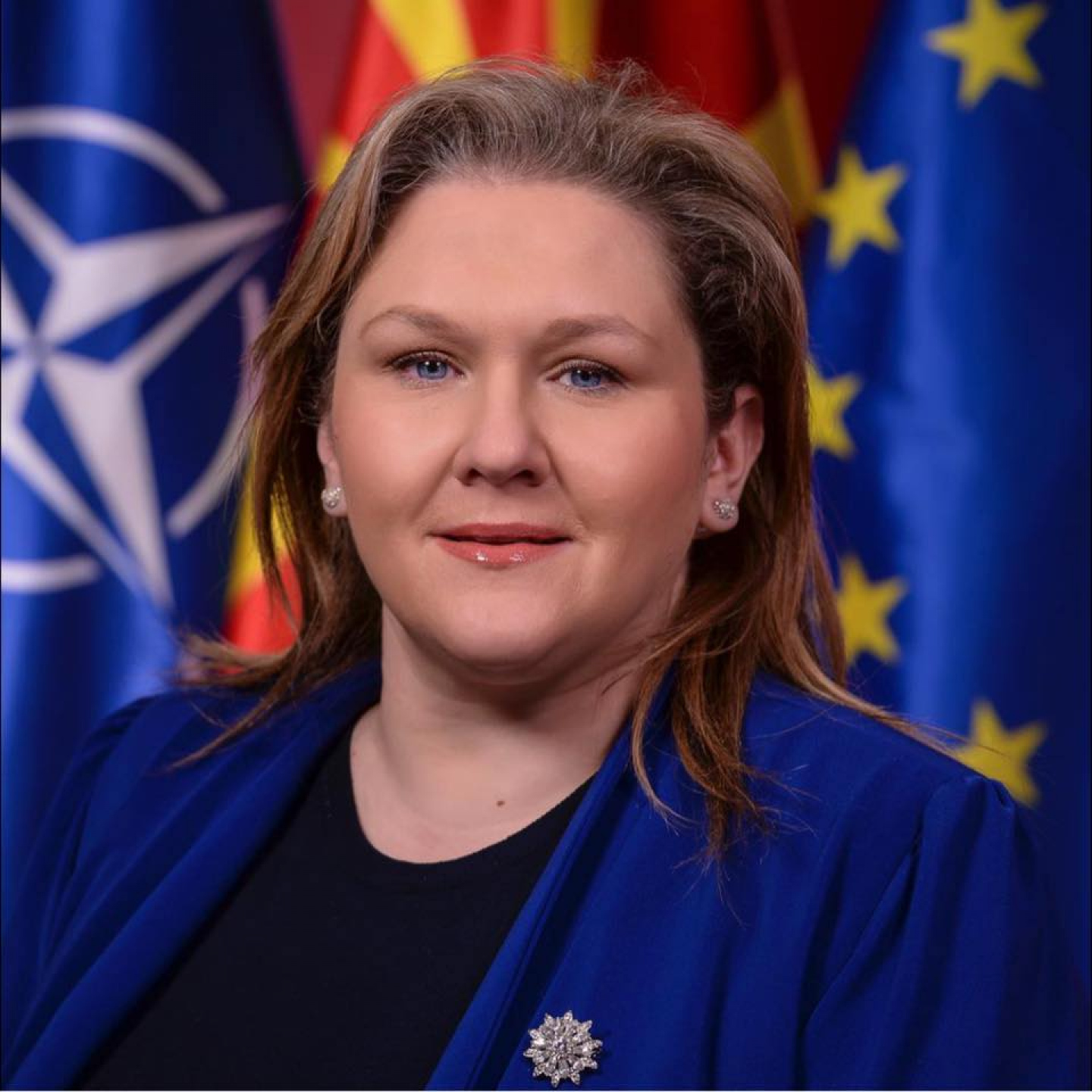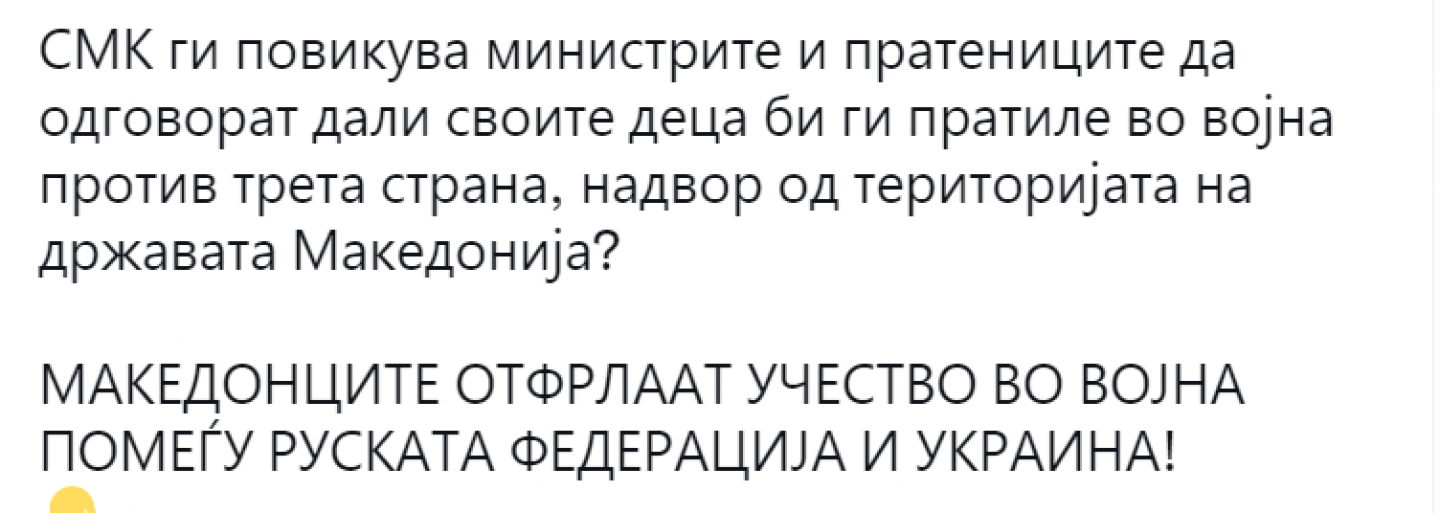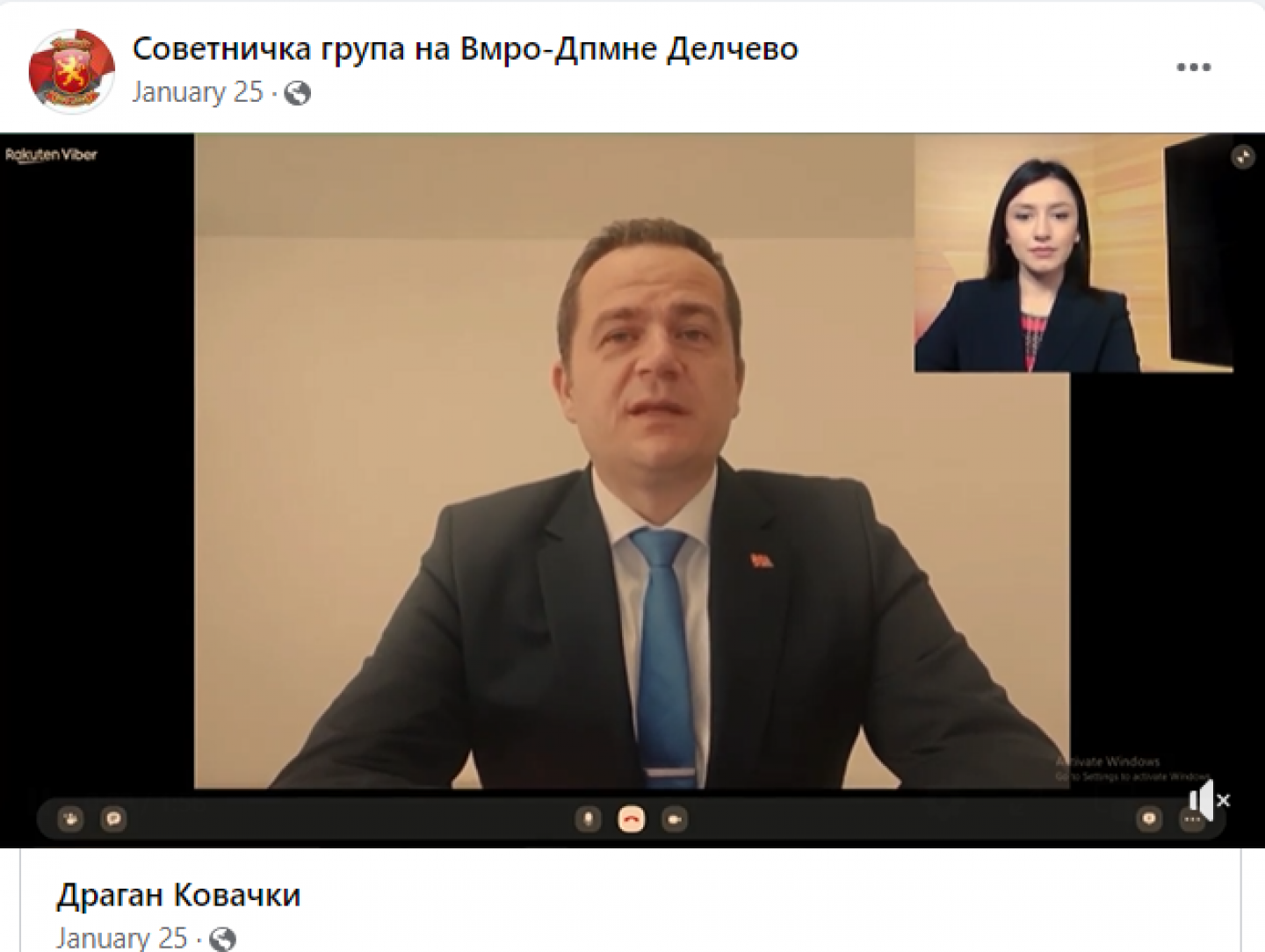Information operation with large magnitude is noted in the case of the statement of the Minister of Defense Petrovska on North Macedonia’s engagement within NATO activities in relation to the Russian aggression in Ukraine. The first wave of the information operation lasted for 24 hours, and it was conducted by online and social media infrastructure with pro-Russian orientation, as well as the Russian Embassy. The information space was flooded with different disinformation narratives, and it goes in line with the conclusion that “presenting multiple conflicting narratives can itself become a technique intended to generate confusion and discourage response.”
On 24 January, the newly appointed Minister of Defence Slavjanka Petrovska gave a statement for the TV show “Top tema” on the situation in Ukraine.

The statement of the newly appointed Minister of Defense Ms. Slavjanka Petrovska for the prime-time magazine “Top Tema” on TV Telma was heavily attacked and, based on the analysis of the FN researchers, triggered an increased online activity, suggesting that an information operation was conducted by the pro-Russian agents of influence, portals and social media infrastructure. Minister Petrovska explained the responsibilities invested in the Government of North Macedonia as a NATO member-state, in fact as any other NATO member-state. The expose of Minister Petrovska can be summarized as follows: (1) North Macedonia supports diplomatic solution to the Russo-Ukrainian crisis; (2) North Macedonia has good bilateral relations with the Russian Federation, yet, as a country, we are obliged to have our national and security interests preserved; (3) Based on the ongoing coordination among the NATO members, our [North Macedonia] Army has allegiance to NATO and responsibility to prepare analysis and assessments on possible involvement, i.e. participation; (4) There is a procedure in which such decision is being made, and such decision has not been enacted

Being silent during the evening of 24 January, the entire operation started after midnight on 25 January, where a number of articles and posts were published and appeared on the FB pages and groups. It all started with posting an article referring to a tweet claiming that “They can’t collect money for electricity in Grchec [a village in Saraj, near Skopje, with predominantly Albanian population] but they will go in war against Russia.” Starting from this moment and continuing for the next 24 hours, a plethora of offenses and different narratives were launched. The actors in this entire information operation are those that traditionally oppose North Macedonia’s membership to NATO, starting from domestic pro-Russian agents of influence and information operations, the Russian Embassy itself, and even a VMRO-DPMNE Member of Parliament.
In terms of messaging and narratives, the following were recorded and presented here in a chronological order (also including the rebuttal of the distortions and manipulations): (1) The Minister’s appearance and looks as a woman were targeted, which is a common practice by these anonymous FB pages/groups; (2) Government capacities were belittled, thus undermining the importance of North Macedonia’s NATO Membership, which is also a technique of distortion and manipulation;

(3) Macedonians decline the plan of the Government to go in a war against Russia – this is a frequently used tactic, to speak on behalf of the “Macedonians”, yet, the fact is that historically [and at present], support to NATO membership has been at the highest level and the most stable one; (4) Building the atmosphere that North Macedonia is just about to engage in Ukraine - this represents a normal procedure as a NATO member-state, so by emphasizing it, it creates dismay among the citizens;

(5) Croatia will revoke its soldiers from Ukraine, while North Macedonia is preparing to engage, which is in contrast to the statements of Croatian PM Plenkovic;

(6) The Russian Embassy is surprised by the statement of Minister Petrovska, which represents a paradox on its own, since North Macedonia is a NATO member-state with clearly defined strategic orientation. Additionally, as claimed in the post of the Russian Embassy: “We draw the attention to the absolutely clear statements of the Russian officials – Russia has never threatened the Ukrainian people and has no intention of undertaking any acts of aggression. In other words, we will not attack, invade nor strike Ukraine,” which is a distortion because of the fact this has already happened in 2014 with the occupation of Crimea and the incitement of conflict, thus supporting the Russian separatists in Donetsk and Lugansk;

(7) VMRO-DPMNE Member of Parliament with tips for the Minister which enforces the narrative that North Macedonia should support the principle of diplomatic solution and sovereignty of the territory, thus implying that North Macedonia should refrain and stay a side from this situation.
To further elaborate and explain the extent and the depth of this information operation within the 24-hours span (25-26 January), some 200 posts were recorded, which shows enormous intensity and indicates coordinated behavior. The above messages and narratives were all recorded within these 24 hours, including the reaction of the Russian Embassy which is noted with 110 posts (c.a. 55% of the total number of posts). Worth noting is that the information operation continued in the following days with articles, posts and reactions on FB recorded even as late as 3 February 2022. The series of statements made by Croatian President Milanovic within this period provided additional material on this topic. In addition, he accused the EU and the US for “pushing Ukraine into an armed conflict with a much stronger opponent,” thus pointing the finger to President Biden’s administration, that it is in “their interest to have this stand-off.” This is completely in line with one of the strategic narratives of the Kremlin. He also reaffirmed another important strategic disinformation narrative of the Kremlin, and that is that “Ukraine is in Moscow’s neighborhood, therefore Russia has all the right to defend its interests.” On 25 January, Croatian PM Plenkovic gave a statement reaffirming Croatia’s commitment to NATO and its partners. These events were picked up by the portals in the Macedonian online space, with an accent on the statements by President Milanovic, thus representing an excellent opportunity to maintain the momentum of the ongoing information operation. Worth mentioning is the fact that as Croatian President Milanovic statements were crossing Balkan borders, the statement of Minister Petrovska was also broadcast by the portals across the region.
The magnitude of the entire information operation (25 January – 6 February) in quantitative terms is as follows: some 52 portals producing 96 articles, at least 174 FB pages/groups posting 308 times to a total number of over 9 million followers.
This information operation aims at creating an artificial “organic” opposition to any engagement of North Macedonia within the NATO operations amidst the Russian aggression toward Ukraine. By becoming a NATO member-state, the Government of North Macedonia has clearly showed its allegiance to NATO and our Western allies, thus bearing responsibility to be trustful and stable ally and partner in any endeavors that aim at enhancing the global security. On another level, this sort of information operation has the following goals: (1) To impose the Russian worldview through its narratives; (2) To promote Russian disinformation and propaganda; (3) To discredit domestic institutions and Western allies; and (4) To discourage any support, action or response in favor of Ukraine and NATO in this particular case. The citizens’ support for the NATO membership historically and at present has been on the highest level and the most stable one. Therefore, such information operations should not influence the judgement and the decision-making of the authorities in North Macedonia.



